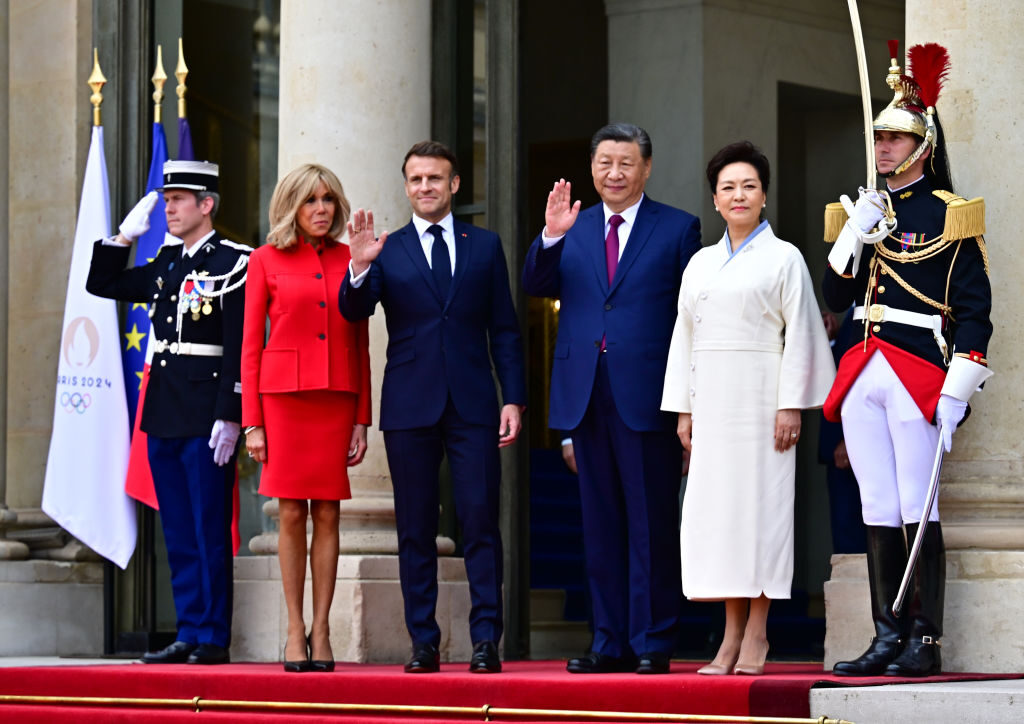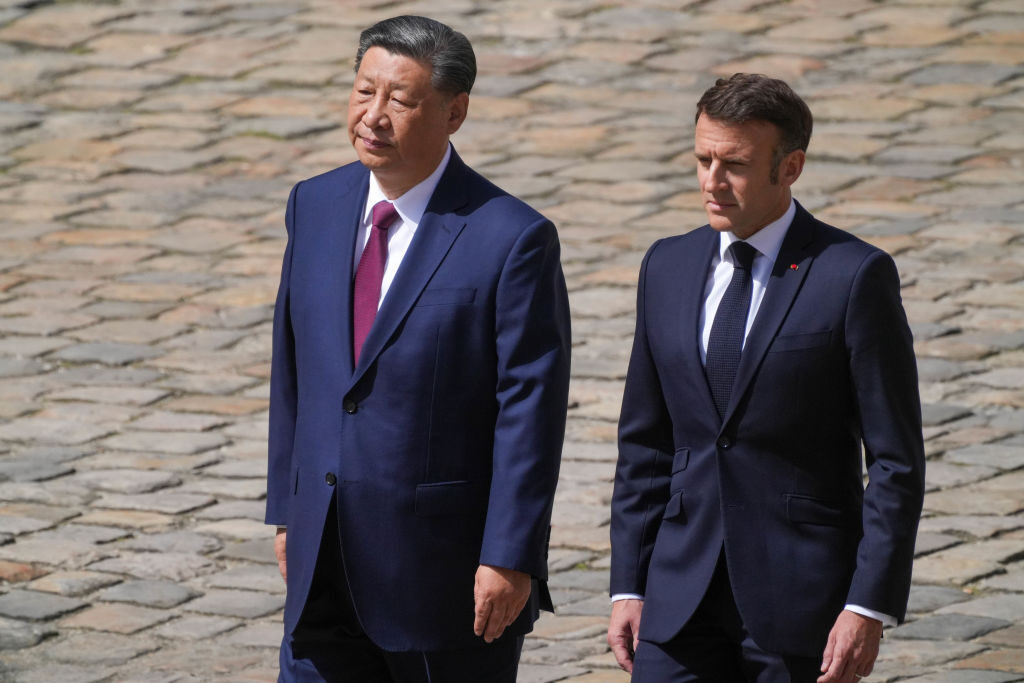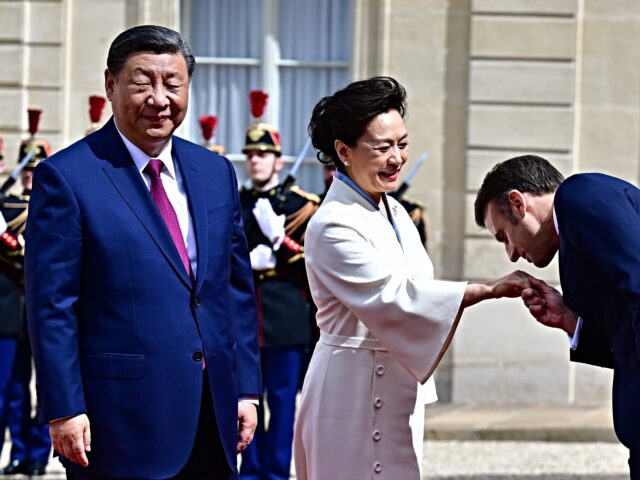Genocidal Chinese dictator Xi Jinping landed in Paris on Sunday for a European tour beginning in France and including stops in Communist Party-friendly Hungary and Serbia.
France is the first European to establish diplomatic ties with communist China and Xi’s visit will mark the 60th anniversary of that event. It is Xi’s first visit to Europe in five years, since the onset of the Wuhan coronavirus pandemic paralyzed most diplomatic engagement around the world.
Xi’s first major engagement on his European tour was a trilateral meeting with French President Emmanuel Macron and European Commission president Ursula von der Leyen, who welcomed him warmly despite overwhelming evidence that Xi is currently conducting the largest-scale genocide of the 21st century. Genocide is a crime that falls under the peremptory norms, or jus cogens, standard, meaning all countries have jurisdiction to arrest and prosecute those credibly accused of committing it. At press time, no reports suggest that French police are preparing to arrest Xi.
Xi emphasized in several statements since landing in Paris that he is looking forward to expanding cooperation with France, particularly in the economic sector – where human rights experts have argued that the ongoing Uyghur genocide makes it impossible for foreign companies to do the due diligence necessary to prevent slave-tainted products from entering their market.

France’s President Emmanuel Macron and his wife Brigitte Macron welcome the Chinese President Xi Jinping and his wife Peng Liyuan, as part of the Chinese president’s two-day state visit, at The Elysee Presidential Palace in Paris, on May 6, 2024. (Christian Liewig – Corbis/Corbis via Getty)
“Due diligence efforts based on social or labor audits are not feasible, both in Xinjiang [occupied East Turkistan, the Uyghur heartland] and in other Chinese provinces that receive transferred ethnic workers from that region,” prominent China researcher Adrian Zenz told Congress last week. “The only ethical response is divestment.”
Xi’s efforts in attracting foreign investment are especially important for China in the aftermath of the Wuhan coronavirus pandemic, as Xi’s “zero-Covid” lockdown and quarantine camp policy scared away a significant percentage of foreign direct investment. China recorded its first-ever decline in foreign direct investment, a drop of $11.8 billion during the fiscal quarter ending in September, in November. Attempts to bring in more investment have slumped, prompting Xi to take on a more personal role in courting potential investors. In March, for example, Xi personally hosted a group of visiting American businessmen – representing firms such as Blackrock, Qualcomm, and FedEx – in Beijing.
“We are planning and implementing a series of major measures to comprehensively deepen reforms, continue to build a market-oriented, legal and international first-class business environment, to provide enterprises from all over the world, including American companies, more space to develop,” Xi promised them.
Landing on Sunday, Xi made French investment in China a priority.
“We welcome more quality French farm products and cosmetics to the Chinese market to meet the ever-growing needs of the Chinese people for a better life. We welcome investment by companies from France and other countries to China,” Xi said in an article written prior to his visit, according to the Chinese Foreign Ministry. “To this end, we have fully opened up China’s manufacturing sector, and will move faster to expand market access to telecom, medical and other services.”
“Some Chinese companies have set up battery plants in France. The Chinese government supports more Chinese companies in investing in France. And we hope that France will ensure that they operate in a fair and equitable business environment,” Xi emphasized.
In statements immediately after landing, Xi listed “aviation, aerospace, nuclear energy, agrifood and green development” as the top sectors where he hoped Beijing and Paris could expand their mutual cooperation.

Emmanuel Macron, France’s president, right, and Xi Jinping, China’s president, during the official welcoming ceremony at the Invalides in Paris, France, on Monday, May 6, 2024. (Nathan Laine/Bloomberg via Getty)
“Our two countries enjoy close coordination and cooperation on climate response, biodiversity protection and global governance,” Xi said. “A growing China-France relationship not only brings benefits to our two peoples, but also provides stability and positive energy to the turbulent world.”
Xi reportedly repeated his call for “cooperation in green and digital transition” in talks with Macron and von der Leyen on Monday.
“China-EU cooperation is in essence complementary and mutually beneficial,” Xi said, according to Chinese Foreign Ministry spokeswoman Hua Chunying. “It is necessary that they properly address economic and trade frictions through dialogue and consultation, and accommodate each other’s legitimate concerns.”
Reports indicated that Macron would emphasize talks about the ongoing Russian invasion of Ukraine with Xi, but much of the conversation focused on trade. Macron described the future of all of Europe as “very clearly depend[ent] on our ability to continue to develop relations with China in a balanced manner.”
“Trade and market access, fair competition and investment, the situation in Ukraine and the Middle East: relations between China and Europe, our coordination, are of decisive importance,” Macron wrote in Chinese text on his Twitter account Monday, sharing a photo of the three leaders.
Von der Leyen emphasized in remarks after the meeting an interest in “fair” trade with China, stating that Europe would “defend our companies; we will defend our economies. We will never hesitate to do so if this is required.”
The EU chief complained that China was “flooding the European market” with cheap goods, asserting, “combined with a domestic demand that is not increasing, the world cannot absorb China’s surplus production.” Von der Leyen also stating Europe would pursue “de-risking” supply chains by investing in manufacturing outside of China.
Her statement did not address the root cause of Chinese “overcapacity” – state-sponsored slavery – or any human rights concerns in China, as per the European Union’s transcript of her post-meeting remarks.
Human rights groups advocated prior to the meeting for Macron not to ignore China’s rampant human rights abuses during conversations with Xi.
“President Macron should make it clear to Xi Jinping that Beijing’s crimes against humanity come with consequences for China’s relations with France,” Maya Wang, the acting China director at Human Rights Watch, said in a statement on Friday. “France’s silence and inaction on human rights would only embolden the Chinese government’s sense of impunity for its abuses, further fueling repression at home and abroad.”
The World Uyghur Congress – which represents the indigenous ethnic group of occupied East Turkistan that Xi has ordered his party to destroy – issued a statement on Sunday condemning France alongside Serbia and Hungary for welcoming Xi at all.
“The World Uyghur Congress opposes the openness displayed by Europe towards the People’s Republic of China (PRC) and its leader, Xi Jinping,” the statement read.
The head of the group, Dolkun Isa – who the Communist Party has attempted to persecute through Interpol – specifically said of France, “The Uyghur genocide must be raised publicly by Macron, urging Xi Jinping to end the ongoing erasure of our people, reflecting the resolution adopted by the Assemblé Nationale recognizing the Uyghur genocide.”
Follow Frances Martel on Facebook and Twitter.

COMMENTS
Please let us know if you're having issues with commenting.